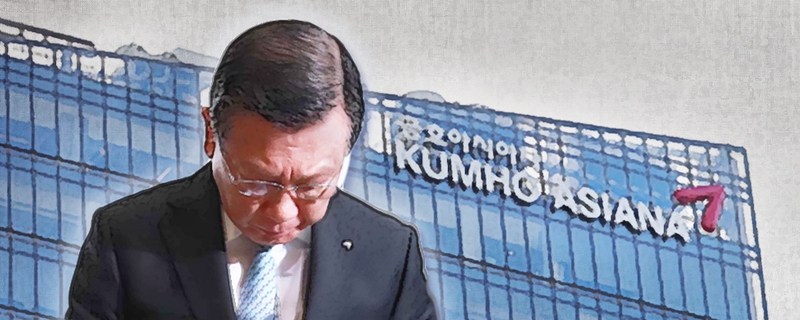Posted on : Mar.29,2019 14:34 KST
Modified on : Mar.29,2019 14:41 KST
Analysts view pressure from KDB as major factor in resignation
Pressure from creditors amid a serious liquidity crisis for Asiana Airlines appears to have played major part in Kumho Asiana Group Chairman Park Sam-koo’s announcement on Dec. 28 that he was stepping down from management. Coming at a time when the airline’s plans for establishing liquidity have repeatedly failed to work and its market credibility has taken a hit over a “qualified” opinion in a recent audit report, the increased pressure from chief creditor bank Korea Development Bank (KDB) was viewed by analysts as a factor in Park’s decision to take responsibility and step down.
According to accounts from Asiana and KDB, Park and KDB Chairman Lee Dong-gull met on Mar. 27 to discuss ideas for the airline’s management normalization. During the meeting, Park asked for KDB’s cooperation toward normalization, to which Lee replied that “there need to be efforts to restore market trust for the majority shareholder and company ahead of any cooperation.” Park raised the possibility of his own retirement while requesting support at the meeting; his public announcement of his departure from management came a day later.
Market observers are now speculating that KDB effectively pressured Park into resigning. At a morning National Assembly National Policy Committee operational briefing the day before, Lee demanded “self-rescue efforts by Asiana” and a “memorandum of understanding (MOU) at a level capable of restoring trust.”
A key company in the Kumho Asiana Group, Asiana Airlines has been plagued with chronic liquidity issues, which last year earned it classification as an “in-depth management target” by KDB. In Apr. 2018, it signed an MOU for financial structural improvements with KDB and other creditors, but it has since failed to uphold the terms. Following a decision to procure around 550 billion won (US$484.19 million), it sold off the Kumho Asiana Group building in Seoul’s Gwanghwamun area and shares in CJ Logistics, but it also failed in its efforts to secure liquidity through perpetual bond issuance and a paid-in capital increase. The perilous situation was prolonged last year when Park extended the elapsed expiration date for 70 billion won (US$61.62 million) in foreign currency-guaranteed loans from KDB, offering his own shares of Kumho Buslines, Kumho Industrial and Asiana to the bank as collateral.
Leaders of South Korea’s two major airlines departed in a single day
The coup de grace in terms of market credibility came recently when Asiana Airlines was given a “qualified” opinion in a recent audit report. The airline made major revisions to the audit report after receiving the “qualified” opinion on Mar. 22 from the accounting firm Samil PwC. Data on major sales and losses were concealed, and current net losses increased by some 90 billion won (US$79.2 million) from what had initially been announced.
It was based on that decision that Park stepped down from management 17 years after becoming group chairman in 2002. Park had previously resigned once before in 2009 following the resale of Daewoo E&C, but remained visibly committed to holding management authority and eventually returned a year later. His departure, combined with the ouster of Hanjin Group chairman Cho Yang-ho at a general shareholders’ meeting the day before, means the leaders who piloted South Korea’s two major airlines for close to 20 years both departed – voluntarily or involuntarily – in the space of a single day.
For the time being, Asiana Airlines appears poised to continue under a group emergency management committee system centering around Vice Chairman Lee Won-tae. That committee now faces the task of overcoming the liquidity crisis for an airline that represents 60% of group sales, while also containing its spread to other affiliates. The governance structure at the Kumho Asiana Group connects Kumho Buslines to Kumho Industries and from there to Asiana Airlines, the last of which includes such subsidiaries as Asiana IDT, Asiana Development, Asiana Sabre, Asiana Airport, Air Busan, and Air Seoul.
By Shin Min-jung, staff reporter
Please direct comments or questions to [english@hani.co.kr]









